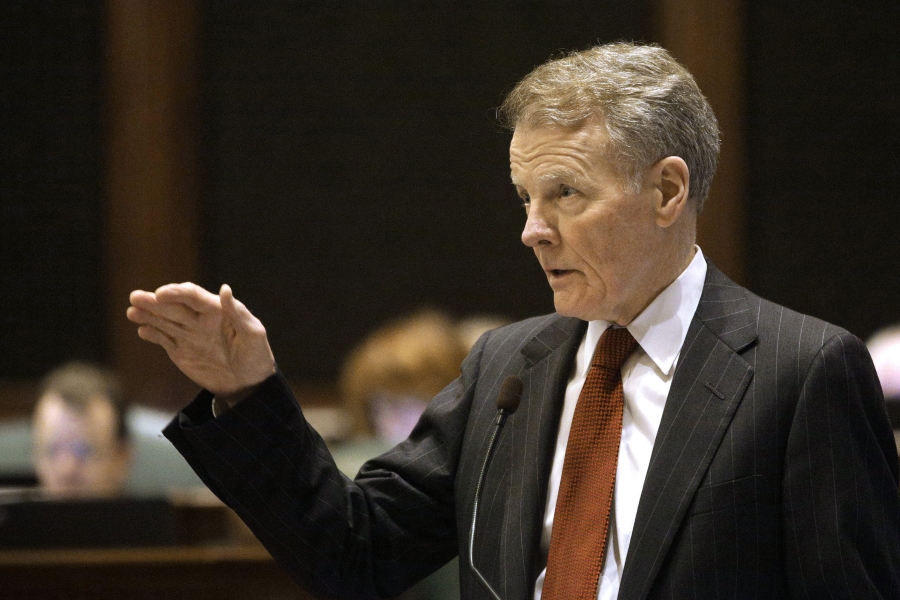Former Ill. House Speaker Michael Madigan was indicted March 2 on 22 counts of public corruption, including bribery, racketeering conspiracy, wire fraud and attempted extortion. Madigan, 79, stepped down from his speakership and his House seat in early 2021.
While the 106-page indictment covers a decade of actions by the former legislator and head of the Illinois Democratic party, one of the earliest acts that seems to have caught the attention of U.S. Attorney for the Northern District of Illinois John Lausch was a 2014 meeting recorded by a cooperating witness, developer See Y. Wong.
The developer met with then-Chicago Alderman Danny Solis, Madigan and other employees of Wong's Wabash Development Group at Madigan’s law firm, Madigan & Getzendanner, which specializes in real estate tax appeals. Wong agreed to hire the firm in exchange for legislative help getting the project, known as Canal Crossing, through the hurdles of permitting, land acquisition and approval. Soon thereafter Solis began to cooperate with the federal corruption probe and recorded Madigan as well. Wong pleaded guilty in late 2020 to defrauding banks involved with the deal. Solis entered into a deferred prosecution agreement with the government in 2019.
It's one of several scenarios alleged in the indictment in which Madigan or his legislative aides intervened in construction projects in exchange for legal work or legislative action that would help move a project along or stop one that wasn't desired. The indictment calls Madigan's political operation "The Madigan Enterprise," and asserts that it existed "to preserve and to enhance Madigan's political power and financial well-being" and to "reward Madigan's political allies," including by using his stranglehold over the legislative process." Madigan is alleged to have personally made $3 million off the various actions of the enterprise.
"The indictment alleges a long-term, multifaceted scheme to use public positions for unlawful gain, including no-show or low-show jobs for Madigan's political workers and private gain for Madigan himself," said Lausch, at at March 2 news conference at the Everett M. Dirksen Federal Courthouse in Chicago.
Michael McClain, 74, a former legislator and lobbyist and longtime confidant of Madigan, was also indicted in the conspiracy. The indictment alleges that, in 2018, McClain told a Madigan staff member to make sure Madigan voted "present" on a bill concerning the transfer of the Chinatown land parcel involved in the development deal because the bill concerned "a developer of his."
If Madigan voted present or abstained on such votes, it would appear that he was recusing himself from voting on a matter involving a Madigan & Getzendanner client, but since the firm was allegedly hired specifically to move the vote and deal along, voting present was actually a matter of concealment to make it appear that he was uninvolved in efforts to transfer the land parcel, rather than recusal, the indictment alleges. That McClain is quoted as saying "our developers" seemingly implies that there were other developers with similar arrangements with Madigan and his law firm.
Much more of the indictment is devoted to the relationship between Madigan, McClain and other parties at Illinois public utility Commonwealth Edison, commonly known as ComEd, a division of Exelon Corp. The indictment alleges that in exchange for political favors and other actions by utility executives, Madigan moved along legislation to increase rates and modernize the utility grid, while also stopping efforts aimed at power supplier reform that would have hurt ComEd's profits. ComEd is alleged to have given $1.3 million to Madigan or his associates.
ComEd agreed to pay a $200-million fine in 2020 as part of a deferred prosecution and admitted guilt in the matter in 2020. The agreement detailed how ComEd requests were funneled through McClain and how he developed a 2011 plan to pay two Madigan associates indirectly as subcontractors even though they did little or no work for the utility. In 2018, the document alleges that McClain asked former ComEd CEO Anne Pramaggiore to hire a Madigan ally who was retiring from the Chicago City Council. Pramaggiore was indicted separately in the probe.
Madigan has maintained his innocence and said in a statement released March 2 that he was "never involved in any criminal activity."
Instead, he said: "The government is attempting to criminalize a routine constituent service: job recommendations. That is not illegal, and these other charges are equally unfounded. I adamantly deny these accusations."
While Madigan maintains his innocence, ComEd has since distanced itself from the former speaker.
"We are not in a position to comment on charges related to the former speaker or beyond what is in the statement of facts in ComEd's deferred prosecution agreement, which resolved the U.S. Attorney's Office's investigation into ComEd and Exelon," the utility said in a statement. ComEd added that it has "implemented comprehensive ethics and compliance reforms to ensure that the unacceptable conduct outlined in the agreement never happens again."
Illinois Gov. J.B. Pritzker (D) appears in the indictment and is alleged to have met with Madigan in Dec. 2018. The government alleges Madigan asked Pritzker to give Solis a $93,000-a-year state board position, supposedly as a reward for helping Madigan win business for his law firm. Solis stepped down in 2019 and did not receive any position from Pritzker. The governor said in a statement he did not remember any such meeting.
"An indictment of this magnitude is a condemnation of a system infected with promises of pay-to-play, and the era of corruption and self-dealing among Illinois politicians must end," Pritzker said in his statement. "The conduct alleged in this indictment is deplorable and a stark violation of the public's trust. Michael Madigan must be held accountable to the fullest extent of the law."
The most serious charges in the indictment carry a 20-year federal prison sentence.






Post a comment to this article
Report Abusive Comment